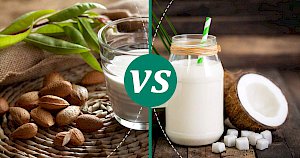Coconut Milk vs Almond Milk: Calories & Nutrition Showdown


Coconut milk vs Almond milk
Nutrition Facts
Serving size:
change
5g10g15g20g30g40g50g60g80g100g120g140g160g180g200g220g250g300g350g400g450g500g600g700g800g900g1000g
1oz2oz3oz4oz5oz6oz7oz8oz10oz12oz15oz20oz25oz30oz35oz40oz50oz
Amount Per Serving:
Serving size:
change
5g10g15g20g30g40g50g60g80g100g120g140g160g180g200g220g250g300g350g400g450g500g600g700g800g900g1000g
1oz2oz3oz4oz5oz6oz7oz8oz10oz12oz15oz20oz25oz30oz35oz40oz50oz
Amount Per Serving:
Coconut Milk vs Almond Milk 100g Compare
| per 100g | Coconut milk | Almond milk |
|---|---|---|
| Calories | 197 | 15 |
| Carbohydrates | 2.81 g | 1.31 g |
| Fat | 21.33 g | 0.96 g |
| Protein | 2.02 g | 0.4 g |
| Water | 72.88 g | 96.54 g |
| Calcium | 18 mg | 184 mg |
| Iron | 3.3 mg | 0.28 mg |
| Magnessium | 46 mg | 6 mg |
| Phosphorus | 14 mg | 1 mg |
| Potassium | 220 mg | 67 mg |
| Sodium | 13 mg | 72 mg |
| Zink | 14 mg | 1 mg |
| Vitaminium B3 (Niacin) | 0.637 mg | 0.07 mg |
| Vitaminium B9 (Folic acid) | 0.014 mg | 0.001 mg |
Discover the Wonders of Coconut Milk and Almond Milk
When it comes to choosing a plant-based milk, the options can be overwhelming. Two of the most popular choices are coconut milk and almond milk. Both have unique flavors and nutritional profiles that make them favorites among vegans, lactose intolerant individuals, and health enthusiasts alike. But beyond their health benefits, these milks have interesting backgrounds and versatile uses that might surprise you.
A Peek into the World of Coconut Milk
Coconut milk, a creamy and tropical liquid, is made by grating fresh coconut meat and then pressing it to extract the milk. It's a staple in many Southeast Asian cuisines, lending its rich texture and flavor to curries, desserts, and even cocktails. But coconut milk is not just about taste; it's packed with medium-chain triglycerides (MCTs), which are fats that your body can easily convert into energy. Interestingly, despite its high-fat content, coconut milk has been found to have heart-healthy benefits when consumed in moderation.
The Rise of Almond Milk
Almond milk, on the other hand, is made by blending almonds with water and then straining the mixture to remove the solids. It has a nutty flavor and a lighter texture than coconut milk, making it a popular choice for smoothies, coffee, and cereal. Almond milk is low in calories and fat, but rich in vitamin E, a powerful antioxidant. Its popularity has soared in recent years, not only for its health benefits but also for its environmental footprint, which is significantly smaller than dairy milk's.
Comparing the Nutritional Landscape
When it comes to nutrition, coconut milk and almond milk are quite different. Coconut milk boasts a high calorie and fat content, with 197 calories and 21.33 grams of fat per serving, making it a dense source of energy. Almond milk is the lighter option, with only 15 calories and less than a gram of fat per serving. This makes almond milk a better choice for those watching their calorie intake.
However, coconut milk outshines almond milk in terms of iron and magnesium content, which are crucial for energy production and bone health, respectively. Almond milk, however, is a calcium champion, with 184 mg per serving compared to coconut milk's 18 mg, making it excellent for bone health.
Both milks are low in protein, with coconut milk containing 2.02 grams per serving and almond milk just 0.4 grams. They're also both free of cholesterol, making them heart-healthy alternatives to cow's milk.
Choosing the Right Milk for You
Ultimately, the choice between coconut milk and almond milk comes down to personal preference and nutritional needs. If you're looking for a low-calorie option that's rich in vitamins and minerals, almond milk might be the way to go. But if you're after a creamy texture and a boost of energy, coconut milk could be your best bet. Both milks offer unique benefits and can be a delicious part of a balanced diet.
Whether you're whipping up a tropical smoothie, a nutty almond latte, or a rich curry, experimenting with these milks can add both flavor and nutrition to your meals. So why not give both a try and discover which one you prefer?
Coconut milk 100g
197kcalCalories source
- 5% CARBS.
- 4% PROTEIN
- 91% FAT
Almond milk 100g
15kcalCalories source
- 34% CARBS
- 10% PROTEIN
- 56% FAT
Compares of coconut milk
- Coconut Milk vs Coconut Water
- Coconut Milk vs Almond Milk
- Coconut Milk vs Peanut Milk
- Coconut Milk vs Oat Milk
- Coconut Milk vs Rice Milk
- Coconut Milk vs Cola
- see all compares of coconut milk
Compares of almond milk
Read also:
- Calories from Coconut milk
- Calories of Squid
- Calories in Agave syrup
- Zebra cakes calories per 100g
- Cucumber sushi roll protein per 100g
- How many calories does cutie clementine have?
- Calories in a half of kalamata olives
- Calories in whole kalamata olives
- Calories for one, two or more kalamata olives
- How much protein in Sun Chips?
Marcin Piotrowicz
calories-info.com creator
Healthy diet and healthy lifestyle promoter
Add comment